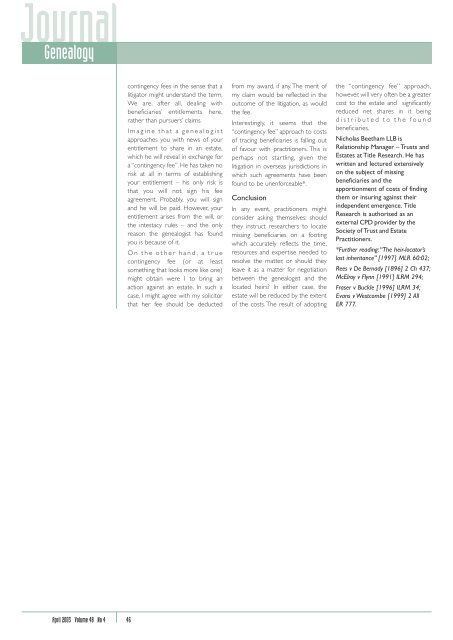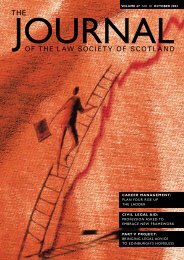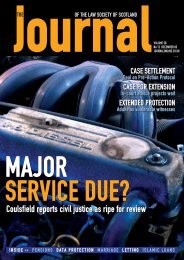Law Society of Scotland - The Journal Online
Law Society of Scotland - The Journal Online
Law Society of Scotland - The Journal Online
Create successful ePaper yourself
Turn your PDF publications into a flip-book with our unique Google optimized e-Paper software.
<strong>Journal</strong><br />
Genealogy<br />
April 2003 Volume 48 No 4 46<br />
contingency fees in the sense that a<br />
litigator might understand the term.<br />
We are, after all, dealing with<br />
beneficiaries’ entitlements here,<br />
rather than pursuers’ claims.<br />
Imagine that a genealogist<br />
approaches you with news <strong>of</strong> your<br />
entitlement to share in an estate,<br />
which he will reveal in exchange for<br />
a “contingency fee”. He has taken no<br />
risk at all in terms <strong>of</strong> establishing<br />
your entitlement – his only risk is<br />
that you will not sign his fee<br />
agreement. Probably, you will sign<br />
and he will be paid. However, your<br />
entitlement arises from the will, or<br />
the intestacy rules – and the only<br />
reason the genealogist has found<br />
you is because <strong>of</strong> it.<br />
On the other hand, a true<br />
contingency fee (or at least<br />
something that looks more like one)<br />
might obtain were I to bring an<br />
action against an estate. In such a<br />
case, I might agree with my solicitor<br />
that her fee should be deducted<br />
from my award, if any. <strong>The</strong> merit <strong>of</strong><br />
my claim would be reflected in the<br />
outcome <strong>of</strong> the litigation, as would<br />
the fee.<br />
Interestingly, it seems that the<br />
“contingency fee” approach to costs<br />
<strong>of</strong> tracing beneficiaries is falling out<br />
<strong>of</strong> favour with practitioners. This is<br />
perhaps not startling, given the<br />
litigation in overseas jurisdictions in<br />
which such agreements have been<br />
found to be unenforceable*.<br />
Conclusion<br />
In any event, practitioners might<br />
consider asking themselves: should<br />
they instruct researchers to locate<br />
missing beneficiaries on a footing<br />
which accurately reflects the time,<br />
resources and expertise needed to<br />
resolve the matter, or should they<br />
leave it as a matter for negotiation<br />
between the genealogist and the<br />
located heirs? In either case, the<br />
estate will be reduced by the extent<br />
<strong>of</strong> the costs. <strong>The</strong> result <strong>of</strong> adopting<br />
the “contingency fee” approach,<br />
however, will very <strong>of</strong>ten be a greater<br />
cost to the estate and significantly<br />
reduced net shares in it being<br />
distributed to the found<br />
beneficiaries.<br />
Nicholas Beetham LLB is<br />
Relationship Manager – Trusts and<br />
Estates at Title Research. He has<br />
written and lectured extensively<br />
on the subject <strong>of</strong> missing<br />
beneficiaries and the<br />
apportionment <strong>of</strong> costs <strong>of</strong> finding<br />
them or insuring against their<br />
independent emergence. Title<br />
Research is authorised as an<br />
external CPD provider by the<br />
<strong>Society</strong> <strong>of</strong> Trust and Estate<br />
Practitioners.<br />
*Further reading:“<strong>The</strong> heir-locator’s<br />
lost inheritance” [1997] MLR 60:02;<br />
Rees v De Bernady [1896] 2 Ch 437;<br />
McElroy v Flynn [1991] ILRM 294;<br />
Fraser v Buckle [1996] ILRM 34;<br />
Evans v Westcombe [1999] 2 All<br />
ER 777.










